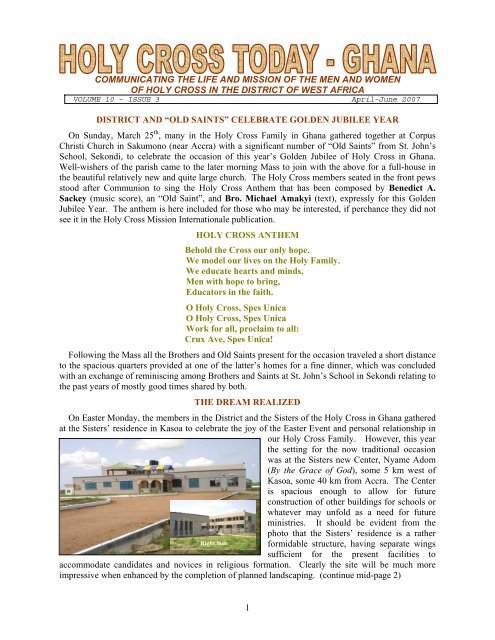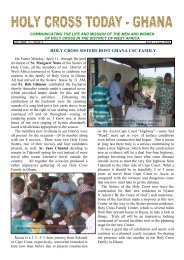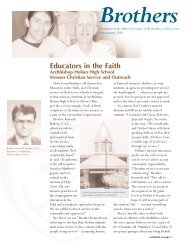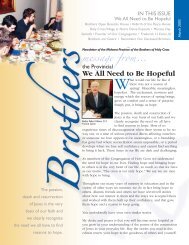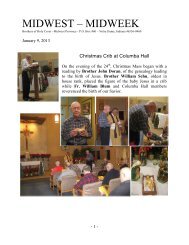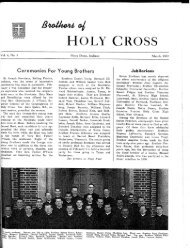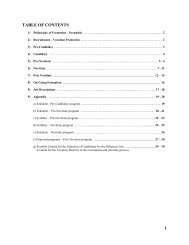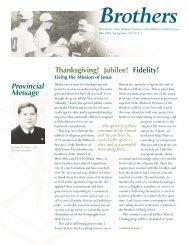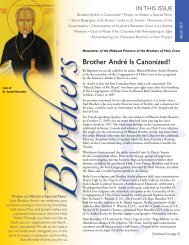Vol 10 Issue 3 Apr - Jun 2007 - Brothers of Holy Cross
Vol 10 Issue 3 Apr - Jun 2007 - Brothers of Holy Cross
Vol 10 Issue 3 Apr - Jun 2007 - Brothers of Holy Cross
- No tags were found...
Create successful ePaper yourself
Turn your PDF publications into a flip-book with our unique Google optimized e-Paper software.
From the Desk <strong>of</strong> the District SuperiorDear Friends and Benefactors:Welcome to this edition <strong>of</strong> <strong>Holy</strong> <strong>Cross</strong> Today Ghana. Many significantevents have occurred since then. More than 45 African heads <strong>of</strong> statesgathered in Ghana to consider a possible continental government.Ghana has also redenominated its currency beginning July 1, <strong>2007</strong>.Also, during this time some important personalities have visited us: TheApostolic Nuncio to Ghana, Most Rev. George Kocherry and Most Rev. MichaelBlume, SVD, the Apostolic nuncio to Togo and Benin. Archbishop Blume is from SouthBend, Indiana and former SVD provincial in Ghana. We also had the Prefect for theEvangelization <strong>of</strong> the Peoples, Cardinal Ivan Dias visited to our Center in Cape Coast,where he interacted with priests and religious from Cape Coast Ecclesiastical Province.He updated the group on the development <strong>of</strong> the Church in his portfolio.The District has rekindled its collaborative effort with the District <strong>of</strong> East Africa. On July13, <strong>2007</strong>, three novices from East Africa join the confreres in West Africa for theirnovitiate. The novitiate programs on the African continent start on the same day - July 13,<strong>2007</strong>. We welcome and congratulate our brothers to Ghana and in a special way welcomeall our men as they start their journey in the Congregation <strong>of</strong> <strong>Holy</strong> <strong>Cross</strong>.We want to congratulate our brothers Vincent Ntsiful, Robert Koomson, Paul Bukari,Nicholas Arthur, Kenneth Goode and Ebenezer Prah, who completed studies at theUniversity <strong>of</strong> Cape Coast and Stephen Aidoo from Cape Coast Polytechnic. Wecongratulate Brother John Affum who also graduated from Institute <strong>of</strong> ReligiousFormation at Catholic Theological Union in Chicago.One <strong>of</strong> the highlights <strong>of</strong> our jubilee celebrations and the special year <strong>of</strong> spiritualrenewal called forth Superior General is the invitation <strong>of</strong> Brother Joel Giallanza, C.S.C.to facilitate our community’s annual retreat. We want to thank Bro. Joel for coming againto Ghana in this jubilee year. I want to thank all those who continue to support our missionin West Africa. May God continue to bless you and your endeavors.—Brother Paul Mensah, CSCDistrict Superior(Dream Realized) Construction for the latter began on a rather isolated stretch <strong>of</strong> land more than twoyears ago. Though security persons were hired to protect things, the large area <strong>of</strong> some 14 acres gaveroom enough for thieves to be a constant menace in removing sections <strong>of</strong> fence wire and buildingmaterials to be sold for pr<strong>of</strong>it. Then a serious dispute arose between the Sisters and the originalcontractor, when it was realized that he was “eating” the money given for construction needs. And theworkmanship was not satisfactory in all areas, as well. After a hiatus <strong>of</strong> almost a year in striving tomake the most <strong>of</strong> a bad situation the Sisters were refunded from Notre Dame St. Mary’s to continuewith a new contractor, who proved reliable and honest.Construction has now been completed to attain a quitebeautiful residence, as can be noted from the picture.At this new Center adequate space is available toestablish facilities for education, a priority project, andother facilities that seem to be realistic undertakings. Ithas been mentioned in an earlier issue that the Districthas purchased land in the Kasoa environs to begin soon,probably within the year, its own <strong>Jun</strong>ior SecondarySchool. This is to be followed, as soon as possible, by aSenior Secondary School, and ultimately to establish aSisters <strong>of</strong> the <strong>Holy</strong> <strong>Cross</strong> in GhanaTeachers Training College.2
Scott has been a campus minister at Hoban for the past five years. The Catholic students compriseabout 85% <strong>of</strong> the enrollment at the school. He has a major role in planning and conducting retreats inwhich all the students participate, and also optional retreats for students on weekends. He has anassistant for these. He is engaged in counseling students especially relating to religious matters, andtries to help and encourage students in regard to vocations to religious life with emphasis on <strong>Holy</strong><strong>Cross</strong> for their consideration.Scott has been greatly influenced by the efforts <strong>of</strong> Bro. Ken Haders, he says, in acquiring a “<strong>Holy</strong><strong>Cross</strong> perspective” in the education and direction <strong>of</strong> the youth with whom he comes in contact. Thishas also encouraged his participation in CSC sponsored programs at ND and especially at St. EdwardsUniversity to become more effective in his campus ministry. And he has felt motivated further to seehow <strong>Holy</strong> <strong>Cross</strong> is involved in its ministries elsewhere in the world, at least making a beginning in thisdirection with his present visit to Ghana.EAST-WEST AFRICAN DISTRICTS COLLABORATEAGAIN IN NOVITIATE PROGRAMSome 7 years ago the Formation Committees <strong>of</strong>the Districts <strong>of</strong> East and West Africa, respectively,perceived the advantage <strong>of</strong> combining the novicesfrom their Districts into a single novitiate in Ghana,possibly owing to the slight edge in numbers <strong>of</strong>novices in Ghana. This collaborative venture wasdeemed successful in attaining the ends <strong>of</strong> religiousformation ascribed to the novitiate, as well as tostrengthen the bond <strong>of</strong> community among thenovices from the two Districts. However, bothDistricts seemed to have sufficient numbers <strong>of</strong>novices to suggest the viability <strong>of</strong> separatenovitiates, and no further plans included a single novitiate for the two Districts’ novices.This year the situation is somewhat different, with 11 persons in the District <strong>of</strong> East Africa tobecome novices, with a relatively small number <strong>of</strong> 3 persons for the novitiate in Ghana. After ameeting <strong>of</strong> minds from both Districts, it was deemed well to again set up a collaborative program forthe novitiate year in Ghana. In view <strong>of</strong> this, three members <strong>of</strong> the District <strong>of</strong> East Africa arrived inGhana in latter <strong>Jun</strong>e: Christopher Nghanzi and Gerard Muwonge are from Uganda, while AlexOkidi is from Kenya—two are seminarians. They will soon enter the novitiate with the threeGhanaians: Pius Kweku Maison, Aristide Oben Biney, George Awuni Depaaya. The picture aboveis <strong>of</strong> the pre-novices at Moreau House in Butumagyebo/Sekondi. The novitiate year begins on July 13at Bl. Andre Novitiate in Ghana with Bro.Nee Waye as director. Concurrently, this date will also bethe beginning <strong>of</strong> the novitiate year at Lake Saaka, Uganda, where Bro. Joseph Kaganda will bedirector for the remaining eight novices in East Africa.Fr. Bob Gilmour, continues in his very capable role as Director <strong>of</strong> the pre-novices at MoreauHouse in Butumagyebu in SekondiJUBILEE PROJECT: “REACHING OUT”The District has set as one <strong>of</strong> its aims during its Golden Jubilee Year to “reach out” into areas in thecommunity with special programs that will be <strong>of</strong> significant benefit to the public. A recent project inlatter <strong>Jun</strong>e was organized by Bro. Tony Dadzie and his “project” committee to help educate thepeople in Moree Village to better understand the government’s present plans for re-denomination <strong>of</strong>the currency, which process was initiated on July 2 nd . Banks had been closed for several days overthe long weekend, including the national holiday on July 1 st . While large posters have been liberallyposted throughout the nation explaining the relationship between new and old currency, for many,especially those with minimal education, the introduction <strong>of</strong> the new currency has caused someconfusion and anxiety. The large Catholic Church in Moree was selected as the best gathering placefor this instruction, the great number attending completely filling the place.4
The transformation process will continue to the end <strong>of</strong>the year with both old and new currencies acceptable inmoney transactions. However, the banks will issue onlynew currency for all withdrawals by respectivecustomers.In brief, 1 new Ghana Cedi, that is 1 GH = <strong>10</strong>,000Cedis.Over thepast fourdecades Commercial Bank clerk explaining new Cedithe value<strong>of</strong> the present Cedi has so inflated that the presentexchange rate is 9,200 Cedis is equivalent to $1 US.Under the new currency, 1 GH = $1.09 US. The coinswill be in “peswas” (Gp) and <strong>10</strong>0 Gp = 1 GH cedi.The old Cedi has maintained an almost constant 9,200cedis:$1 for the past several years, its inflating valueparalleling that <strong>of</strong> the dollar. Ghana’s economypresently seems fairly solid, and continues to attract foreign investors.For many <strong>of</strong> us the use <strong>of</strong> a billfold to hold the considerably great reduction in paper notes to becarried for normal transactions will now be possible once again, instead <strong>of</strong> carrying a pocketful orplastic bag as necessary with the volume <strong>of</strong> old Cedi notes for daily purchases..NEWS BRIEFSBro. Some Kenneth <strong>of</strong> the several Goode, hundred who in now devotes a considerable amount <strong>of</strong> time in vocational recruitmentin the District, is also on the Archdiocesan Vocational Committee. This committee includespriests, brothers and sisters, from each religious community in the archdiocese. It serves as avehicle for planning and organizing vocation programs conjointly to enable larger groups to becontacted and to share in ways that have been found effective in promoting religious vocationswithin respective communities.The Institute for Continuing Formation formally ended its 9-month session on <strong>Jun</strong>e 29 th . Therewere 23 <strong>Brothers</strong> and Sisters participating in the program from 9 different countries. The occasionwas celebrated with Mass in the Blessed Andre Chapel, which was followed by a farewell programby and for all at ICF, Bro. Bob Aron, FIC continues as clearly capable director <strong>of</strong> the ICFprogram.In mid-<strong>Jun</strong>e Sr. Esther Entsiwah, CSC invited all the <strong>Brothers</strong> who had completed studies forgraduation at the University <strong>of</strong> Cape Coast or Cape Coast Polytechnic earlier in <strong>Jun</strong>e for a party atthe Sisters’ residence in Takoradi to celebrate this occasion. The event was much appreciated by<strong>Brothers</strong> Nicholas Arthur, Paul Bukari, Kenneth Goode, Vincent Ntsiful, Ebenezer Prah andStephen Aidoo. Sister Esther allowed a week or more respite from their labors for setting the date<strong>of</strong> the celebration, albeit, formal graduation ceremonies at UCC and CCP will not be held untilOctober. The <strong>Brothers</strong> had been sorely pressed during the final months <strong>of</strong> studies doing theresearch on assigned projects, as well as write up quasi-thesis reports <strong>of</strong> their results, in addition toheavy final exams before winding up their studies. Congratulations to all on their respectiveaccomplishments!While not an unusual occurrence at this time <strong>of</strong> the year, the quite severe water shortage, especiallyin the Cape Coast area has finally run its course with recent heavy rains to augment the cityreservoir’s water supply. Frequent power outages still occur owing to the hydroelectric dam’sreservoir at low level, causing decreased generation <strong>of</strong> electricity. On the other hand, relativepeace, political stability and economic growth prevail here in Ghana—(counting our blessings)!5


